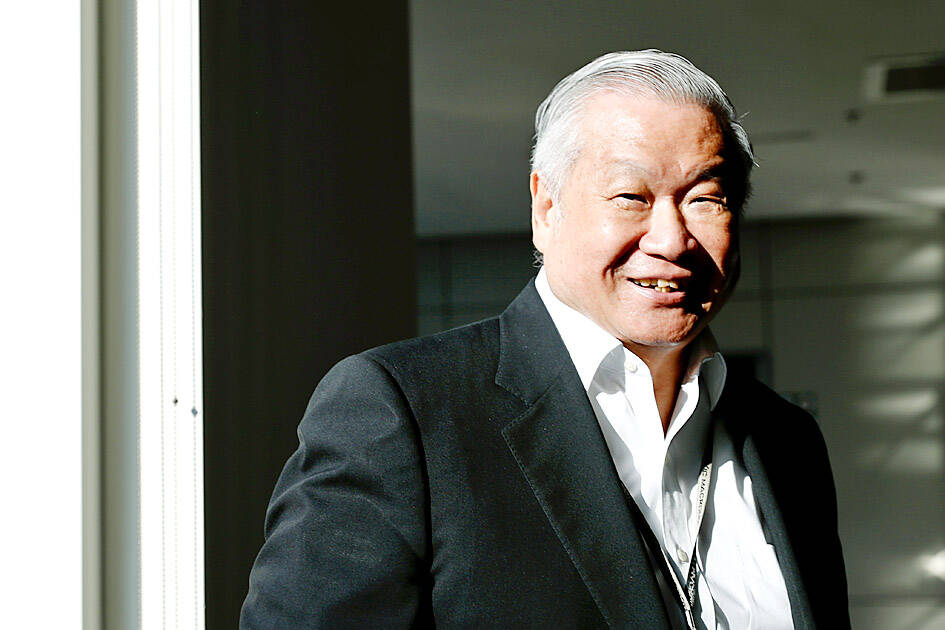Macronix International Co (旺宏), the world’s biggest supplier of NOR flash memory chips, yesterday said it did not expect the memorychip industry to pick up significantly in the first half of next year as a weak global economy — China in particular — and rising inflation have dampened consumers’ appetite for electronics.
In Europe, the economy is battling high inflation caused by Russia’s war in Ukraine, while the US-China technology dispute has dealt a blow to China’s manufacturing sector and consumer spending, Macronix said.
As the global economic recovery remains in limbo, it would take much longer to see a dramatic reduction in the supply chain’s excess inventory, caused by a boom in market demand two years ago, Macronix chairman and CEO Miin Wu (吳敏求) said.

Photo: Ritchie B. Tongo, EPA-EFE
The company has seen a dip in revenue contributions from China due to weak demand, Wu said, adding that some Taiwanese manufacturers have also allocated capacity away from China.
“I just cannot find any reason to convince myself that next year will be a better year,” Wu said. “There could be a chance of a recovery in the second half of next year, if there is any improvement at all.”
Wu said he expects a lukewarm recovery in the first half of next year, and that NOR flash memory chips used in vehicles, and industrial and medical devices would be major pillars supporting the business.
“The automotive, industrial and medical segments are relatively stable, when half of our businesses are declining,” Wu said, adding that vehicles nowadays are equipped with a growing number of microcontrollers, which use NOR flash memory chips.
NOR flash memory chips made up about 46 percent of the company’s revenue in the second quarter, Macronix said.
The company reported a net profit of NT$71 million (US$2.2 million) in the second quarter, following a net loss of NT$355 million in the first quarter.
Commenting on China’s advancements in semiconductor manufacturing, Wu said Huawei Technologies Co (華為) has demonstrated to the world that it is capable of making advanced application processors without access to US technology, as its latest Mate 60 Pro smartphone is equipped with a 7-nanometer processor.
High costs and an unsatisfactory yield would not be an issue given the company’s support from the Chinese government, he said.
However, Huawei still lags far behind global chipmakers and it would take up to 20 years to catch up, Wu said, adding that developing semiconductor equipment might be the key to help it advance its technology faster.

Semiconductor business between Taiwan and the US is a “win-win” model for both sides given the high level of complementarity, the government said yesterday responding to tariff threats from US President Donald Trump. Home to the world’s largest contract chipmaker, Taiwan Semiconductor Manufacturing Co (TSMC, 台積電), Taiwan is a key link in the global technology supply chain for companies such as Apple Inc and Nvidia Corp. Trump said on Monday he plans to impose tariffs on imported chips, pharmaceuticals and steel in an effort to get the producers to make them in the US. “Taiwan and the US semiconductor and other technology industries

SMALL AND EFFICIENT: The Chinese AI app’s initial success has spurred worries in the US that its tech giants’ massive AI spending needs re-evaluation, a market strategist said Chinese artificial intelligence (AI) start-up DeepSeek’s (深度求索) eponymous AI assistant rocketed to the top of Apple Inc’s iPhone download charts, stirring doubts in Silicon Valley about the strength of the US’ technological dominance. The app’s underlying AI model is widely seen as competitive with OpenAI and Meta Platforms Inc’s latest. Its claim that it cost much less to train and develop triggered share moves across Asia’s supply chain. Chinese tech firms linked to DeepSeek, such as Iflytek Co (科大訊飛), surged yesterday, while chipmaking tool makers like Advantest Corp slumped on the potential threat to demand for Nvidia Corp’s AI accelerators. US stock

The US Federal Reserve is expected to announce a pause in rate cuts on Wednesday, as policymakers look to continue tackling inflation under close and vocal scrutiny from US President Donald Trump. The Fed cut its key lending rate by a full percentage point in the final four months of last year and indicated it would move more cautiously going forward amid an uptick in inflation away from its long-term target of 2 percent. “I think they will do nothing, and I think they should do nothing,” Federal Reserve Bank of St Louis former president Jim Bullard said. “I think the

SUBSIDIES: The nominee for commerce secretary indicated the Trump administration wants to put its stamp on the plan, but not unravel it entirely US President Donald Trump’s pick to lead the agency in charge of a US$52 billion semiconductor subsidy program declined to give it unqualified support, raising questions about the disbursement of funds to companies like Intel Corp and Taiwan Semiconductor Manufacturing Co (台積電). “I can’t say that I can honor something I haven’t read,” Howard Lutnick, Trump’s nominee for commerce secretary, said of the binding CHIPS and Science Act awards in a confirmation hearing on Wednesday. “To the extent monies have been disbursed, I would commit to rigorously enforcing documents that have been signed by those companies to make sure we get